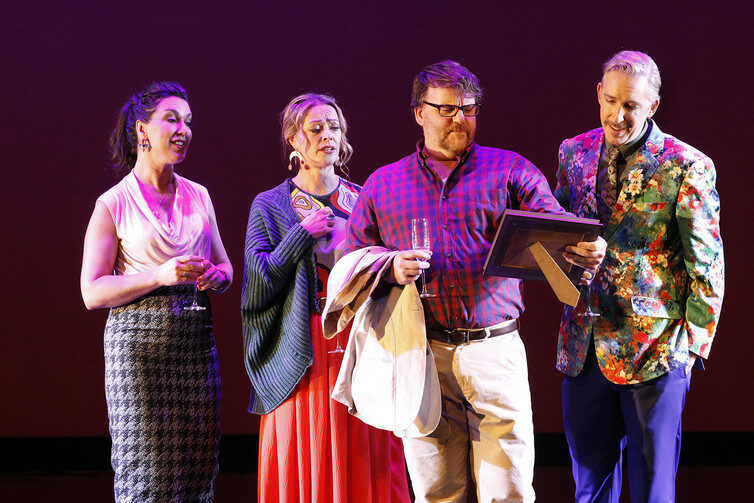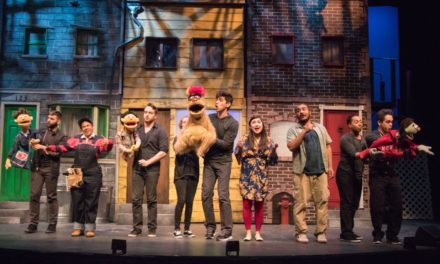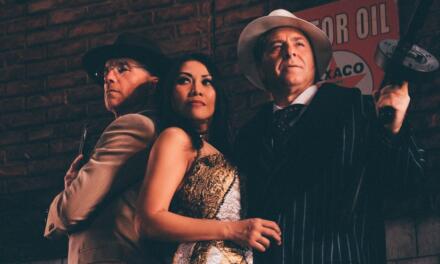Original Australian musical theatre seems to be a relatively well-kept secret. The existing repertoire, however, is a continuously expanding banquet of narrative and musical delights.
The premiere this week of Victorian Opera’s first original piece of musical theatre Banquet of Secrets brings a new tasty morsel to the table.
Composer Paul Grabowsky provides the score to a libretto written by Steve Vizard. In it, four friends, portrayed by Antoinette Halloran, Dimity Shepherd, David Rodgers-Smith and Kanen Breen, come together for their ritual annual dinner.
On this particular night, one of them questions how well they know each other after 21 years of friendship. Subsequently, each friend shares a secret they have kept from one another. Cue conflict and more than enough reason to sing.
It is rare for a piece of new Australian musical theatre to debut in a main-stage production, let alone be fortunate enough to receive an additional presentation. Banquet of Secrets is scheduled for a second season at the Powerhouse Theatre, Brisbane, in April.
This may, in part, be due to the illustriousness of the show’s creators. However, the piece is also the beneficiary of Victorian Opera’s extensive commissioning program. It is the 16th work to be prepared and seasoned through the company’s development process.
Operas, musical works and plays are often the recipients of commissions. But musicals tend to be considered a commercial art-form, and, therefore, are ordinarily neglected by funding bodies.
There are exceptions: locally, James Millar and Peter Rutherford’s musical A Little Touch of Chaos began as a commission from WAAPA. And the international juggernaut Matilda, about to open in Melbourne, was instigated by the Royal Shakespeare Company as a summer musical.
Generally, though, musicals are expected to find their own feet through commercial, or independent, production.
Still, these are exciting times for Australian musical theatre. It seems more people are writing for our indigenous musical theatre than ever before. Or perhaps we are more aware of the work being created.
Events such as the former OzMade Musicals concerts and the current Home Grown series, create spaces for writers to showcase their work.
The Victorian College of the Arts Music Theatre program has made a commitment to developing a number of new Australian musical theatre pieces. It also aims to present one Australian work annually.
Similarly, New Musicals Australia offers an annual submission program, out of which one lucky musical will reach production.
Alternatively, a show may receive an independent commercial production, as the new Peter Fitzpatrick/Anthony Costanzo musical CrossXRroads, will when it premieres at Chapel off Chapel in April.
Indeed, last year theatre maker John Senczuk was prompted to suggest “The Time is Ripe for The Great Australian Musical.” In his essay on the state of the homegrown musical, Senczuk cites Justin McDonnell’s findings from a 2009 Music Board of the Australia Council report, which advise,
It is no longer good enough to look at the musical theatre area and by labeling it ‘commercial’ claim it as no concern of funding agencies.
Senczuk’s essay prompted much needed conversation. This culminated in an industry symposium hosted by the VCA in September 2015, to discuss ways for the industry to further develop our writers and their stories.
One of the key outcomes of this event was a financial commitment from the Marriner Group to raise one million dollars to professionally develop ten new shows.
Composer Casey Bennetto (Keating!) acknowledges that, “music theatre is something that a lot of main-stage producers go to when they want the assurance of money in the bank.”
Both the Melbourne and Sydney Theatre Companies have a history of staging musicals. Most recently MTC had a sellout success with Ladies in Black, by Tim Finn and Carolyn Burns, a show developed by the Queensland Theatre Company where it premiered in 2015.
Similarly, opera companies also often turn to the commercial musical theatre repertoire as a means of broadening their audience and adding money to their coffers.
Victorian Opera has previously presented a number of Stephen Sondheim musicals. Opera Australia has presented Sondheim, and more recently in commercial partnership with John Frost, South Pacific, The King and I, Anything Goes, and their forthcoming production of My Fair Lady, directed by Julie Andrews.
If Australian subsidized companies are willing to turn to the commercial musical theatre repertoire to add variety to, and bolster their seasons, then surely they might also feel obligated to develop new Australian musical theatre works to further boost our local industry and writing talent.
In a recent interview with ABC Radio, composer Grabowsky has suggested that Victorian Opera is leading the charge in this respect, and that Opera Australia, one of the nation’s most subsidized companies, is perhaps not carrying its own weight in developing new work.
Whilst Opera Australia has recently produced productions of Bliss, The Rabbits, and the made-for-television soap-opera/musical The Divorce, perhaps the company should also consider investing in the future of Australian mainstream musical theatre.
Victorian Opera’s Managing Director Andrew Snell believes, “you’ve got to be willing to invest and try your luck.”
The company’s commissioning structure offers a three-year developmental process, during which each work is supported and nurtured theatrically, dramaturgically and musically.
It is not guaranteed that all commissioned works will reach the stage, but Victorian Opera’s record is remarkably solid.
There will no doubt be debate as to whether Banquet of Secrets is a musical or an opera. Snell acknowledges Grabowsky’s musical style leans toward and reflects numerous popular influences, encouraging the company to label the work “a musical.” Alternatively, Grabowsky alludes to it being closer to opera.
Still, the traditional lines between musical theatre and opera are blurring and a detailed discussion of genre is another article for another time.
What is important is that another new Australian music theatre work is about to find an audience. And perhaps if more subsidised companies could follow suit, homegrown musical theatre might become a feast to satiate many appetites.![]()
This article was originally published on The Conversation. Read the original article.
This post was written by the author in their personal capacity.The opinions expressed in this article are the author’s own and do not reflect the view of The Theatre Times, their staff or collaborators.
This post was written by Matthew Lockitt.
The views expressed here belong to the author and do not necessarily reflect our views and opinions.



















